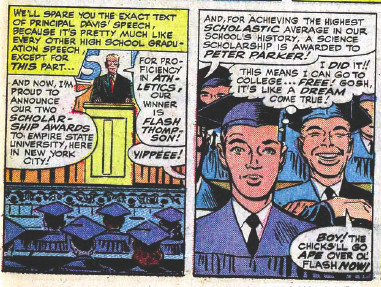In a comic book, time is infinite. Though that wasn’t always the case.
Take this panel from Amazing Spider-Man #28 for instance. Here, we have a very definitive moment in time in Peter Parker’s life – his high school graduation. Not only is this a definitive moment in time, but it also demonstrates a somewhat concrete passage of time from the first instance readers met Peter Parker in Amazing Fantasy #15 to ASM #28. About two years have passed in Peter Parker’s comic book life – demonstrating a continuum that closely resembled real-time as AF #15 was released in 1962 and ASM #28 came out in 1965.
These are the instances in comic books that really get my brain jogging. What was the original intent of Stan Lee and Steve Ditko? Were we supposed to follow Peter Parker/Spider-Man through high school and then slowly fade to black as he got older? Did Spider-Man’s commercial success alter a planned beginning, middle and end to the comic book life of Peter Parker? And at one point was it decided that time, at least something close to real-time, no longer existed in this universe?
A large part of what made Amazing Spider-Man so successful was the fact that the superhero was a teenager – a character that the bulk of comic book readers could relate to because they themselves were teenagers. Peter’s problems with girls, bullies and family, sandwiched into his full-time job as a really unique superhero, were so realistic, you had to keep reading to find out how it was all going to get resolved. Somehow, I don’t think Spider-Man would be so successful if he was still having these social issues in his 40s. Not to mention the “adult” figures in Peter’s life like Aunt May and J. Jonah Jameson, needed to stick around since they were such vital supporting characters in this ongoing story that Stan and Steve originally crafted. Given how old and frail she was always portrayed, I can’t imagine Aunt May reaching her mid-100s.
Today, anything that “dates” your character in a meaningful way is the equivalent of a four-letter word in comic books. Peter and Mary Jane were married but never had children, because a little web-slinger would have started a clock of sorts within the comic book. When the baby was born, that mean 9 months had passed. If the baby starts walking or talking, that means at least more time had passed beyond that. And if the kid becomes a toddler, forget it – then you’re dealing with the Power Pack.
Of course, Marvel took things a step further when they completely annulled Peter’s marriage to MJ. I think there was an understanding there that a marriage that had existed, in real-time, since the 1980s, needed to progress in some way or it would just become an obstacle for the writers to have to deal with on a regular basis. So it was nixed, and now that element of time, vis a vis, Peter’s romantic relationships, is less important.
But is time such a bad thing? One of the biggest criticisms from comic book readers is that creators are afraid to demonstrate too much “growth” in characters. I’ve been reading Spider-Man comic books since I was 7, but really, how much has Peter grown in that time? He’s had some catastrophic life moments he’s had to deal with, but none of them relate to getting older. I may be speaking for myself here, but I obviously see the world and myself a lot differently at 30 than I did when I was 20. Should we expect that same kind of perspective shift from an aging comic book character?
And while time doesn’t pass, you always get a sense when reading an issue of ASM that the real world is being reflected in some way. Betty Brant was introduced to readers in the early 1960s as a secretary at the Daily Bugle newspaper. Today, she’s writing a news blog. A blog is obviously a very “now” reference. Yet she’s made this transition to the Internet age in a fictional world where it’s only been a few years since she was doing the whole “His Girl Friday” act in 1963.
There’s no use fighting the fact that time will continued to exist on this skewed axis in the comic book world. These moments of vaguery will continue to pass us all by as if they were days and months in real-time. All we have are cultural references that are in some ways more dated than the personal milestones, like a graduation or a child, to remind us that the world we are reading is happening in a time, somewhere. In a place, sometime.






The whole “different thing” about Spiderman was supposed to be that he was a teenager. And while the clock did run on him a bit, I also note that he was still in college ten years after his high school graduation (didn’t follow him much after about 1975, so I’m not sure if he actually finished his studies or dropped out or what).
While it’d be nice if every person that put their mind to it were able to write a long-running series that went well into the triple digits, but I think most people when starting a story considers it on a small scale just in case they get cancelled. Really interesting to think about, especially with something like Spidey.
I haven’t read that much ASM, but I know the whole dealie with the passing of time was still a problem with Ultimate Spidey, too. The series itself is around ten years old, but in terms of goings-on in the story itself, it’s only been one or two years, making it slightly awkward to be hearing Britney Spears references in early issues only to have them dropped later on since her public image made a major change in the last ten years.
As for things like babies acting as a reference of sorts, I automatically thought of the Rugrats series. Going through the series, the cast of babies have been exposed to radio, video tapes, DVDs, and even mp3s in their later episodes, which makes absolutely no sense. Things only got more confusing when the spinoff series came about, actually aging the cast the appropriate ten or so years that passed by in the real world. Ugh… brain… hurting.
I’ve actually thought a lot about “Marvel time,” for some reason. I think in the first few years of the MU, time moved at about the same speed as the real world. Peter Parker graduating from high school, Reed and Sue getting married, etc.
Then it started to slow down–I think around the time Franklin Richards was born (1968). By the 1980s, characters will still aging, but maybe about one year for every four or five real world years. Thus, Peter Parker could go to graduate school from about mid-70s and dropped out mid-80s-ish. Franklin grew older, from an infant in 1968 to maybe 5 or 6 years old in the mid-1980s.
I think it was when Jim Shooter left Marvel (i.e. shortly after Peter and MJ married) that Marvel entered a period where characters are always the same age, never to mature. Peter is always about 25, Franklin is always 5, etc.
It all depended on the flexability of the editor or the determination of the writer at the time. Since it’s commonly accepted that Peter took up the webs at the age of 15 in 1962 and that he graduated high school in 1965 and began to attend ESU. So, that would make comic book time flow just as even paced as real time, since that would make him around 17-18.
It was here that time slowed down abit as Peter never seemed to graduate college until 1979. Perhaps Stan realized himself that the endearing charms of Peter was that he was a troubled youth and to remain relevant to the high schoolers and college age kids reading the mags he purposely slowed down the entire Marvel U to keep them all but mainly the webhead from maturing too fast.
So when exactly does each issue take place in Peter’s life. Well I can tell you that in ASM 136 events had occured in real time. It says so on the front page. It had been exactly 2 years since that fateful evening with the Goblin and the murder of his love Gwen. So that would put Peter at the age of 19-20 when Gwen was killed. Peter himself then spent two years trying to get over her and begin a relationship with MJ he was probably 21-22 here. They didnt date long then as she ended things shortly after he graduated college (sort of). Then we head off into the 80’s where things get a bit confusing since it’s not clear just when he ages how long he remains stagnant. That’s the problem with these comics with no school or birthday issues or holiday themes besides 312 that I’m aware of I cannot pinpoint his exact age from then on to his current age of 25-27.
One more thing I found out while digging through some back issues and some wiki pages I found that Peter aged 5 years in the time between the first clone saga and the last one. So if Peter was 21-22 at the time of the first Clone Saga (ASM 141-151) then he was 26-27 at the end of the last one, but now considering a LOT of the Saga was retconned thanks to OMD then maybe he was younger. That still leaves ALOT of issues to cover 419-441, 1-58, 500-700 to be exact. So perhaps he aged a couple more years to fill up Morlun/the Other (assuming those issues still count) Brand New Day, Dark Reign, the Guantlet and Big TIme. Then there’s Spider Island, Ends of the Earth and Dying Wish/Superior Spider-Ock saga to cover. Thats a LOT of time to be covered in just one year. So taking this into account Peter is probably 28-29 years of age. He is 27 at least but perhaps he’s a bit older but no more that 30.